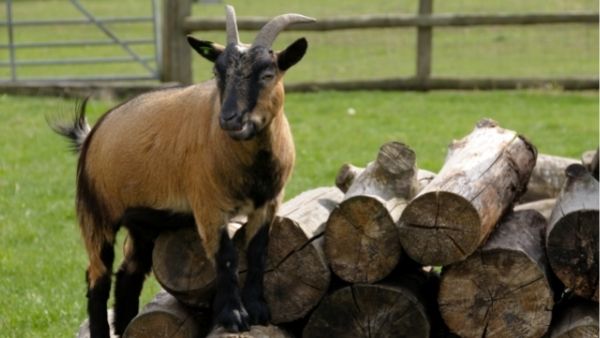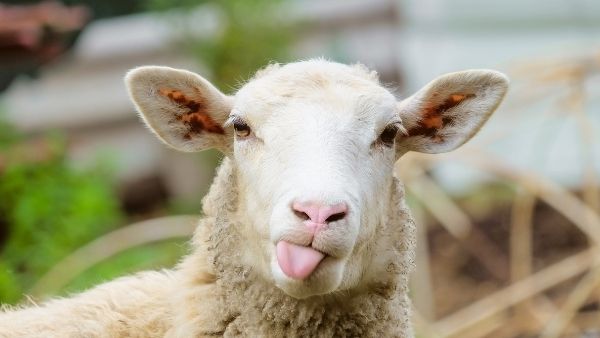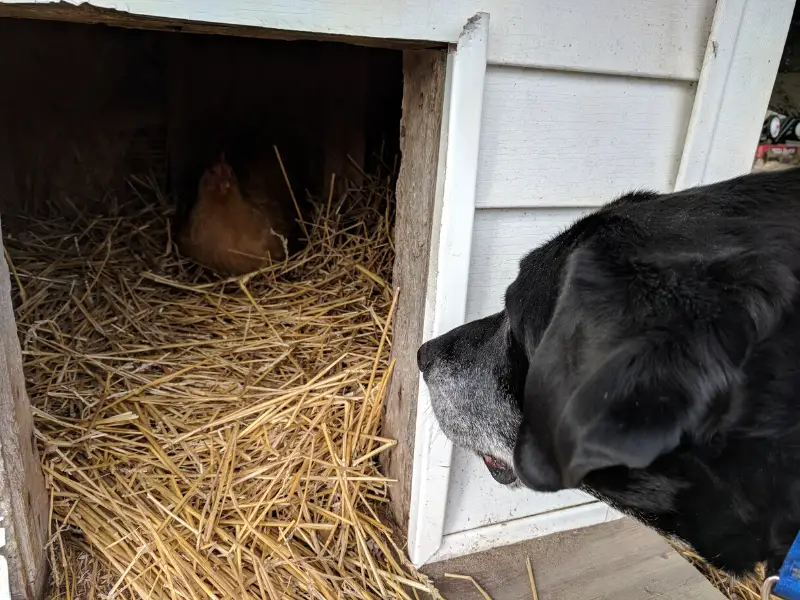Goats and sheep are both popular forms of livestock for small homesteads since they don’t require much room and they’re easier to handle than cattle. But of the two types of livestock, which is a better choice for homesteaders?
Goats are a better choice for most homesteaders since they are smaller and more profitable. Sheep require good grazing land and even terrain, while goats are more forgiving. However, both goats and sheep offer advantages and disadvantages as homestead livestock.
When it comes to choosing goats or sheep for your homestead, a lot of your decision should come down to what your pasture looks like and how good your fencing is. Read on to find out more about why goats are a better match for most novice homesteaders.
Advantages of Raising Goats
Goat meat is the most popular red meat eaten across the globe, and there are many other benefits that homesteaders can enjoy when they raise goats on their farms. Here are some of the advantages of raising goats:
- Goats can provide a wide variety of artisan products: Goats can be farmed not just for their meat and milk, but also for materials such as cashmere, milk-derived soap products, horn, hide, candles, leather, and fertilizer. Since many homesteaders are operating to be as self-sufficient as possible, this makes goats a powerhouse of productivity.
- Goats can clear scrub land and be raised on hilly terrain: The ability of goats to graze in forested, scrubby areas with little grass means that they can help to clear poison ivy and saplings out of uncleared acreage. Check this post on this site for a more in-depth look at how goats are used to clear land.
- Goats can be used as pack animals: Goats are easily trained to carry a pack as beasts of burden, which makes them useful for a homesteader needing to haul firewood or other heavy loads around the farm. They also make great pack animals for mountain adventures.
- Goats have good personalities as family pets: In turns hilariously mischievous and friendly, the personality of goats are often compared to clever dogs. This makes them entertaining livestock to keep around on the farm, even when they use their intelligence to get into trouble.
- Small livestock: Goats come in a wide range of sizes, and miniature goats are a good match for homesteaders will smaller farms to work with.
- Attractive diverse breeds: Goats come in many different heritage breeds in a wide variety of colors and markings. Goats also come with several kinds of horns. This means that there is a goat breed for just about any personal preference.
- Don’t need much space: Because of their small size and economical fodder needs, goats don’t require a lot of space to roam around. However, goats do enjoy vertical space. To make the most of a small pasture for goats, homesteaders should include climbing stations such as rocks, dirt piles, or wooden structures.

There are many good reasons why you might consider goats a good match for your homestead. If you’re thinking, “should I get goats?”, here are some questions to ask yourself:
- What kind of terrain does my homestead have? For overgrown acreage that needs razing, a herd of goats can be a good match. If you’re trying to maintain pasture in an orchard, on the other hand, a flock of sheep may be a better choice.
- How secure are my fences? Goats will actively test fences again and again until they find the weaknesses necessary to get through. Goats can also jump and climb fences that sheep wouldn’t try to get through.
- Do I want pets or just livestock? Goats can be fun pets for homestead children and are more interactive than sheep.
For many homesteaders that only have small landholdings, goats can be a great foray into livestock that doesn’t require the investment that getting into cattle or sheep does. Goats breed so easily and quickly that a herd can be built up in short order.
Advantages of Raising Sheep
Sheep have been a popular form of livestock across much of the world for human history due to their hardiness and easy maintenance. Here are some of the advantages of choosing sheep for a small homestead:
- Sheep don’t do damage: While goats are good for clearing out scrub, they’re also known for stripping bark from trees. This can damage and even kill trees in their pasture. Sheep stick to grass, making them good orchard companions. Sheep also have small hooves that resist causing soil erosion or damaging grass.
- Sheep don’t need expensive outbuildings: Sheep don’t have to be kept in full barns during inclement weather like cattle—most will be just fine with a lean-to to get out of the worst weather conditions.
- Good feed-to-meat conversion rates: Sheep put on weight easily and steadily compared to cattle and other livestock, and this can make them an economical choice when raising them for mutton rather than milk and cashmere.
- Mutton is more popular than goat’s meat (chevron) in America: Many Americans are not familiar with eating goat’s meat and may be reluctant to try it, while lamb is eaten readily in much of the world including the United States.
- Small livestock: Sheep are small livestock compared to cattle and this makes them much easier for a lone farmer to handle and guide without needing additional help from other farmhands. Sheep are also less dangerous to handle than their larger livestock counterparts.
If you’ve got a homestead with more delicate pasture land, sheep can be a good choice for building up the land without damaging the soil or landscape. If you’re considering getting sheep, ask yourself the following questions:

- Am I willing to acquire and train a livestock guardian such as a sheepdog? Sheep may be vulnerable to predators without some kind of protection.
- Can I raise sheep for slaughter? It is difficult to run a profitable sheep operation without producing both meat and wool.
- Do I have good grazing land? While goats can be put out on fallow overgrown land, sheep require good orchard grasses and legumes to put on market weight.
Even though sheep are a great addition to many homesteads, examining how they will fit into your farm operations can help guarantee that they’ll be a strong match.
Disadvantages of Raising Goats
Even though goats can provide many benefits for homesteaders, they aren’t the best type of livestock for everyone. There are many aspects of raising goats that can make them as challenging as they are profitable. Here are some of the drawbacks you may run into raising goats:
- Require heavy-duty fencing (and may still get out of it): Goats are clever creatures and if you’re unlucky, you may end up with a goat or three that make it their personal mission in life to escape their pasture. While the goats aren’t likely to venture very far, this can still leave them in danger of escaping into a nearby roadway or a neighbor’s garden.
- Goats can be obnoxious: While goats are known for their outgoing personalities, they can sometimes suffer from an excess of personality. This leads to them doing mischievous or even outright annoying things like treating your Jeep as their own personal mountain.
- Goats are destructive: Goats are good at clearing up overgrown land and they aren’t picky at pasture, but they’re also prone to destroying just about anything they can get their teeth on. They’ve even been known to eat scrap metal.
- Goats are noisy: Goats are loud, and goats like to make noise. Goats perform a loud repetitive noise known as bleating, and some goats can really pump up the volume on their bleating too to the point that it almost sounds like screaming. This is something to take into consideration if your homestead is close to other properties.
- Goat milk has a strong flavor: A Billy Goat can cause the milk from nearby does to take on a strong, rancid flavor. Goat milk also tends to turn gamey quickly after being drawn. While people do use goat’s milk for both milk and cheese, it tends to be more popular in bathing products where it serves as a moisturizer.
- Goats can have sensitive digestive systems: Goats can become susceptible to many types of stomach problems if they aren’t managed well. Goats should only be fed fodder made for goats and can make themselves sick eating feed intended for other animals such as cattle.
- Goats can act feral: While some breeds of dairy goats are docile and easy-going, there are rangier breeds designed for survival in rough places. Unless handled often when they’re young, these goats can become skittish and difficult to capture. Combined with their natural agility, this can leave you with few options when it comes to cornering them for care.
Goats are fun to raise and can provide many products for use around the farm. That being said, the many drawbacks of keeping goats around the homestead means that they definitely aren’t the right livestock for everyone.
Disadvantages of Raising Sheep
Like goats, sheep can also be a great match for small homesteaders due to their relatively low maintenance needs and easy size. However, there are disadvantages to raising sheep that go along with the potential benefits. Here are the drawbacks you may run into when you raise sheep on your homestead:
- Sheep are vulnerable to predators: In open pasture, sheep can be vulnerable to predators such as coyotes, stray dogs, and big cats like panthers. Once a local predator or a pack of dogs has discovered an unguarded flock of sheep, this can cause serious loss of life to the flock. Sheep usually require some kind of livestock guardian such as a Great Pyrenees dog to protect them.
- Sheep can be vulnerable to parasites: Since sheep are often used to revitalized fallow irrigated pasture, this can leave them vulnerable to soilborne intestinal parasites that can cause low feed-to-grain conversion, anorexia, and even death.
- Sheep stink: Sheep foster the same manure smell of any barnyard livestock. But along with this familiar stench, sheep give off a strong smell of lanolin. This grease produced by the skin glands of the sheep gives sheep wool (and the sheep themselves) a musky, sour odor.
- Shearing sheep can be a hassle: Less and less people specialize in the shearing of sheep, which means that unless you’re prepared to do it yourself, you might find it hard to get someone else to handle the task. There are hairless sheep breeds available, but this reduces the number of products the sheep can produce.
- Need good pasture: Unlike goats, who can be pastured on what would be considered unfavorable terrain, sheep need good pastureland full of grass to put on weight. This means they may not be a good match for more forested farms.
Sheep can be compatible with many other types of homestead livestock. They can be a good stepping stone into larger livestock such as cattle or horses. But the disadvantages associated with sheep mean that any farmer considering adding them to the homestead should weigh the pros and cons carefully.
Are Sheep or Goats More Profitable?
Goats are more profitable than sheep for small homesteads, and this is for several reasons. Most of the reasons revolve around the fact that goats are more efficient to raise than sheep in almost every respect. Here is a breakdown of how goats are more profitable than sheep.
- Less time to market: A goat can be brought to market age in three to five months compared to 9 to 12 months for a sheep. (Source: USDA)
- More offspring per female: On average a ewe will only birth 3.9 lambs at most over a five-year breeding run, while a goat is capable of birthing fifteen or more kids throughout her fertility. Goats are more likely than sheep to have twins and also more likely than sheep to have triplets. Goats have even been known to have five kids at a time. (Source: TNAU Agritech)
- More diversity of products: Goats can produce a wider variety of products for sale than sheep. Goat hides and kid leather are more sought-after than sheep products, and goat products lack the strong lanolin smell of sheep products.
- Require less fodder than sheep: Goats don’t need as much feed and pasture as sheep do to get to market weight. They’re also more tolerant of kitchen scraps and other supplementary food than sheep.
- Produce more milk than sheep: For the same amount of feed, goats can produce a gallon of milk more efficiently than a sheep can. However, both types of livestock need free access to fresh, clean drinking water for optimal milk production.
Even though goats are more profitable than sheep, either type of livestock can be raised successfully by small homesteaders with enough preparation and the right husbandry. But if you look at the objective profits, a goat operation will be more profitable over time in almost every case. Homesteaders must decide whether this additional profit is worth the trouble of adding goats to the roster.
Tips for Raising Goats and Sheep
Regardless of whether you choose goats or sheep to expand the livestock on your homestead, there are a few simple tips you can follow when you begin your operation to make the process less of a hassle. Follow these tips to get the most out of your first goat or sheep herd:
- Keep careful records. When you first start raising livestock, you’ll be learning as you go along. Keeping careful, detailed records of your flock, their medical histories, and observations can help you maintain the flock more easily over time as you learn more about your chosen breed. Livestock management apps such as Livestocked can help make things simpler.
- Expect losses. No matter how well you take care of your livestock, you’ll run across circumstances that cause you to lose members of your flock or herd. Be sure to note down the circumstances of any illnesses, injuries, or deaths to prevent further tragedy moving forward with your breeding operation.
- Invest in strong fences. Putting up the money to put in powerful fencing measures before you ever buy a piece of livestock can save you hours of headache later on once your goats have figured out how to escape the paddock. Even sheep will test fences, and nothing will ruin your Tuesday like having to track down and round up thirty head of roving sheep.
- Provide enrichment activities. Enrichment activities keep livestock from becoming bored and engaging in destructive behaviors, and they can also distract livestock to the point that they spend less time trying to test fences.
- Don’t go overboard. It’s better to start with just a small handful of goats or sheep and then slowly build up your herd rather than buying a large lot of animals all at once. Buying too many animals at once make record-keeping a nightmare. It also greatly increases your investment in fodder and vet care.
- Focus small and work your way up. While you can get many different products from sheep and goats, raising a herd of meat goats is very different than raising a herd of dairy goats. Using every part of the animal sounds great in theory, but in practice, it’s a ton of work to render an animal from horn to hoof. Most breeds are also geared towards one major use or another.
- Careful mixing goats and sheep with larger livestock. Heavier livestock such as large pigs and cattle can easily trample and kill kids and lambs. Pigs have also been known to eat newborn goats and sheep. Be sure that goats and sheep are kept separate from other livestock during the breeding season to avoid injuries and deaths.
Keeping your homestead organized and making sure that you have all the supplies you need before you purchase livestock can help get you off on the right foot. As long as you know what you’re getting into, acquiring small livestock like goats and sheep can be an exciting experience for your homestead.
Goats and Sheep Make Great Stock for the Homestead
No matter which type of livestock you choose, goats and sheep both offer a wide range of benefits to homesteaders who don’t have the acreage for larger animals. Whether you’re keeping them as homestead pets or want to start a serious breeding operation, goats and sheep are a great first step into the world of keeping homestead livestock.



